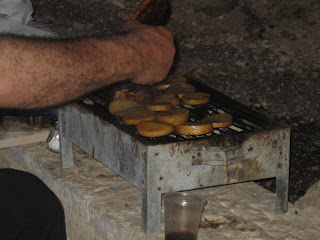Objectively, it's an average Israeli apartment. Three bedrooms plus a small safe room that we use as a library. Two bathrooms. Two small mirpesot (outdoor porch areas) - one for the sukkah and one for sitting on, feeling privileged to have a view of Jerusalem and for swooning over the fact that we actually live in Israel.
The most distinctively different feature of our new quarters is that we have no kitchen. That is, we have no separate room that can be called a kitchen. What we have is a kitchen wall that leads directly into our dining "room", which, come to think of it, isn't a room either, but just an extension of the kitchen wall. Nevertheless, week after week, we manage to crank out meals from our kitchen wall and serve guests in our dining "room".
This past Wednesday night, we celebrated our first aliyahversary by the Hebrew calendar. We celebrated with another couple who were on our aliyah flight by inviting Rabbi Nachman Kahana to speak on the topic, "The Connection Between Aliyah and Geula." We were hoping for 40 people and were overwhelmed that there were close to twice that number in attendance. Rabbi Kahana spoke for approximately an hour and, thinking about it later, I was blown away by how far we have come in just one year.
There are things that used to baffle us when we came here to visit that we now accomplish with ease. For example, we were never sure on what temperature to set the air conditioner in the summer, so we used to set it at 19 degrees. Ha! Living on shekels, we would never do that now.
We used to be confused about which plastic and glass bottles could be recycled and which couldn't. In Israel, there are a number of individuals who cash in used bottles and donate the money to tzedaka. But only some bottles are eligible for redemption. The rest of the plastic bottles go in the big green recycling cage across the street and most glass jars, regrettably, go in the trash. We're not guessing anymore about what to do with each empty container, but I was thinking about how, a year ago, I was never sure.
It took us some time to find a brand of cream cheese that has a similar consistency to what we were used to. "Just remember to look for the daisy on the label," my sister-in-law reminded me when I asked to take an empty container with me so I could buy exactly that brand.
The cheese and the deli turkey I most prefer both have cherry tomatoes on the package. If they change the packaging, I'm in trouble, but for now, I shop by graphics and get what I need.
Kishke is another achievement of our lives in Israel. Despite this Wikipedia article that claims it's available in most Israeli supermarkets, we haven't been able to find it. We did buy one product that says kishke in Hebrew letters, but the food inside bears absolutely no resemblance to the food product we call kishke, except for the slight orange coloring. So, in Israel, I learned to make my own. It's not that hard, especially after the vegetables are grated. And the homemade version is probably a lot healthier than the MealMart kishke we used to buy.
 |
| Oh MealMart kishke! I DO miss you! |
These everyday examples don't tell the whole story, but they do tell part of the story of our first year. Adult olim quickly realize how much of their adult lives in America were managed without requiring too much new thinking. Here, there's so much to learn every day. But, a year and two days in to our lives in Israel, I can see how, eventually, many things that were baffling have become routine.
Over the past year, my husband and I made new friends, brought two of my favorite rabbis to our shul to speak, began teaching and learning Torah with a new depth, found work, bought a car and insurance and learned to shop in shekelim. My husband is often asked to officiate at bnei mitzvot and weddings and to teach Torah in Jerusalem, but he is also developing many non-rabbinic aspects of himself. I finished ulpan, learned a bunch of new recipes, learned how to cook in celcius and how to use the Egged bus system and ran a successful English book swap and sale that raised money for JobKatif, the organization where our oldest daughter does her national service.
But above all, we start year two with profound gratitude for the privilege it is to live here, relying on and feeling closer than ever to Hashem. Here, the spiritual aspects of life are continually strengthened and the material aspects of life continually diminish in significance. That's the best part.















































